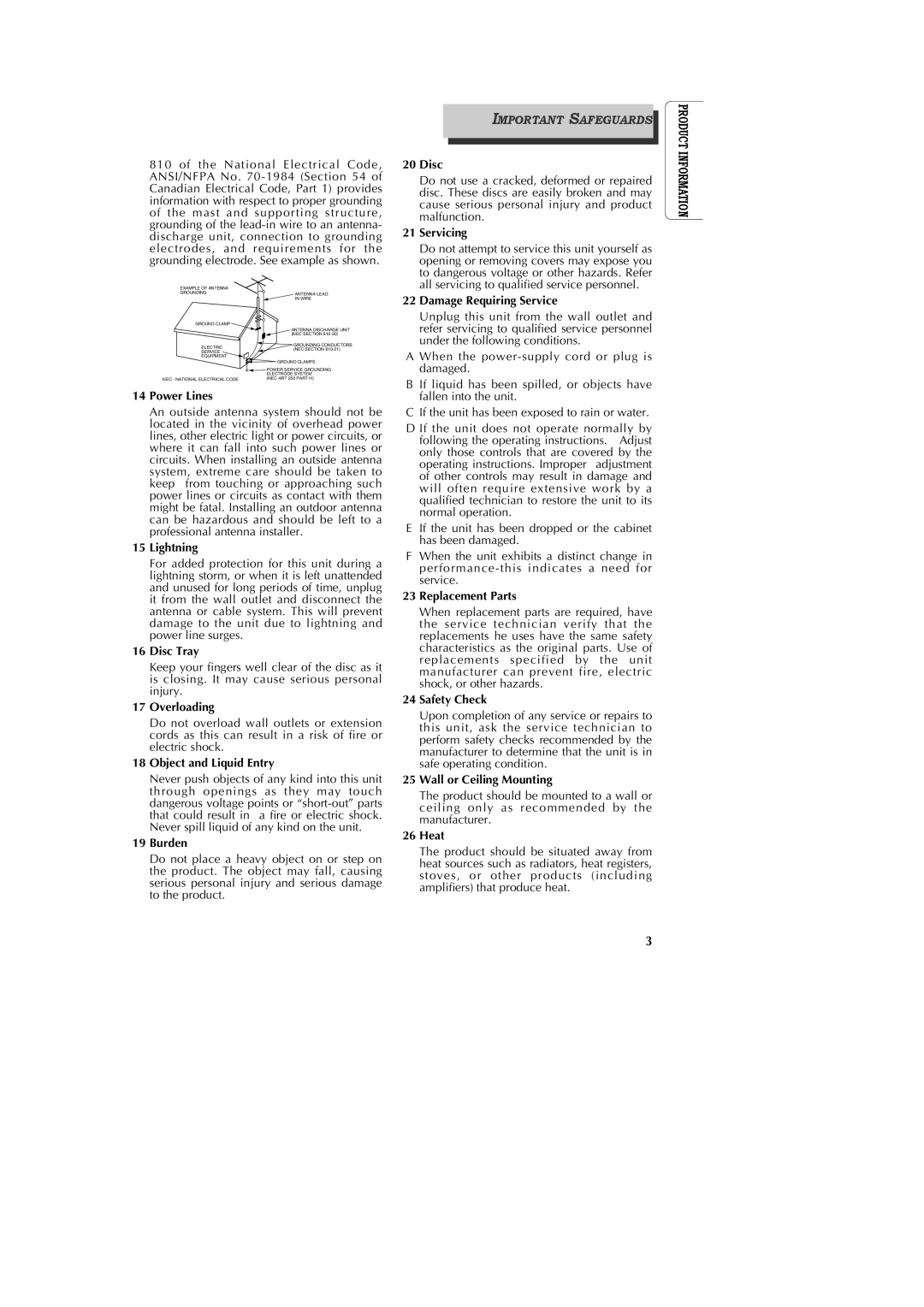
810 of the National Electrical Code, ANSI/NFPA No.
EXAMPLE OF ANTENNA
GROUNDINGANTENNA LEAD
IN WIRE
GROUND CLAMP |
| |
| ANTENNA DISCHARGE UNIT | |
| (NEC SECTION | |
ELECTRIC | GROUNDING CONDUCTORS | |
(NEC SECTION | ||
SERVICE | ||
EQUIPMENT |
|
![]()
![]() GROUND CLAMPS
GROUND CLAMPS
| POWER SERVICE GROUNDING |
| ELECTRODE SYSTEM |
NEC - NATIONAL ELECTRICAL CODE | (NEC ART 250 PART H) |
14 Power Lines
An outside antenna system should not be located in the vicinity of overhead power lines, other electric light or power circuits, or where it can fall into such power lines or circuits. When installing an outside antenna system, extreme care should be taken to keep from touching or approaching such power lines or circuits as contact with them might be fatal. Installing an outdoor antenna can be hazardous and should be left to a professional antenna installer.
15Lightning
For added protection for this unit during a lightning storm, or when it is left unattended and unused for long periods of time, unplug it from the wall outlet and disconnect the antenna or cable system. This will prevent damage to the unit due to lightning and power line surges.
16Disc Tray
Keep your fingers well clear of the disc as it is closing. It may cause serious personal injury.
17Overloading
Do not overload wall outlets or extension cords as this can result in a risk of fire or electric shock.
18Object and Liquid Entry
Never push objects of any kind into this unit through openings as they may touch dangerous voltage points or
19Burden
Do not place a heavy object on or step on the product. The object may fall, causing serious personal injury and serious damage to the product.
IMPORTANT SAFEGUARDS
20Disc
Do not use a cracked, deformed or repaired disc. These discs are easily broken and may cause serious personal injury and product malfunction.
21Servicing
Do not attempt to service this unit yourself as opening or removing covers may expose you to dangerous voltage or other hazards. Refer all servicing to qualified service personnel.
22Damage Requiring Service
Unplug this unit from the wall outlet and refer servicing to qualified service personnel under the following conditions.
AWhen the
BIf liquid has been spilled, or objects have fallen into the unit.
CIf the unit has been exposed to rain or water.
DIf the unit does not operate normally by following the operating instructions. Adjust only those controls that are covered by the operating instructions. Improper adjustment of other controls may result in damage and will often require extensive work by a qualified technician to restore the unit to its normal operation.
EIf the unit has been dropped or the cabinet has been damaged.
FWhen the unit exhibits a distinct change in
23 Replacement Parts
When replacement parts are required, have the service technician verify that the replacements he uses have the same safety characteristics as the original parts. Use of replacements specified by the unit manufacturer can prevent fire, electric shock, or other hazards.
24 Safety Check
Upon completion of any service or repairs to this unit, ask the service technician to perform safety checks recommended by the manufacturer to determine that the unit is in safe operating condition.
25 Wall or Ceiling Mounting
The product should be mounted to a wall or ceiling only as recommended by the manufacturer.
26Heat
The product should be situated away from heat sources such as radiators, heat registers, stoves, or other products (including amplifiers) that produce heat.
PRODUCT INFORMATION
3
